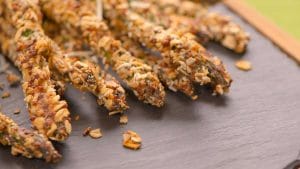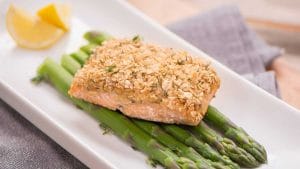By Brooke Bulloch
As a registered dietitian and mom, I agree that oats make a delicious hot breakfast option, but oats are so much more than “porridge”. The nutrition science nerd in me appreciates the health benefits and nutrition density of oats as well as their positive effect on the gut microbiome. The mom in me loves that oats are an affordable and versatile kitchen staple. In this article, I’m sharing my top 5 reasons to love oats – I hope it leaves you just as excited about oats as I am.
First, the Coles Notes on Oats



Oats are considered a whole grain because they maintain the entire plant component – the bran, germ and endosperm. The most common or familiar types of oats include steel-cut, rolled and quick oats. The difference between the oat types is the degree of processing the kernel undergoes:
- Steel-cut oats are oat kernels (also known as groats) that are roughly chopped into smaller pieces. They have a chewy texture and the longest cooking time of about 30 minutes.
- With rolled oats the kernels are steamed and flattened after being chopped. Their cooking time is 5-10 minutes.
- Quick oats are made from rolled oats that have then been cooked, dried, and chopped further. As the name suggests they have the quickest cooking time and are sometimes referred to as ‘instant or minute oats’.1
While the processing differences demonstrate how the oat has changed from the original state, all oat types are considered a whole grain. The greatest difference will be in taste, texture and digestion time – steel-cut oats take longer for the body to digest and quick oats the fastest.

Here are my top 5 reasons to love oats – a dietitian and mom perspective
- Reduce heart disease risk
High blood LDL cholesterol levels is a risk factor for heart disease. Oats contain a soluble fibre called beta-glucan, which has been shown to significantly lower LDL and total cholesterol levels2. The first study to reveal that oat consumption reduced plasma cholesterol levels goes back to 1963. The study observed that by enriching bread with rolled oats, there was an 11% reduction in total cholesterol levels3. Evidence over the years has repeated the cholesterol-lowering outcomes of beta glucan and oats.
How much do you need to consume? The science demonstrates that 1.5 grams of beta-glucan daily is an effective cholesterol-lowering dose. This is equivalent to roughly half cup of cooked oats.4 - Improve blood sugar regulation
Just as the soluble fibre in oats (the beta glucan) lowers LDL cholesterol, numerous studies show potential for improvements in blood sugar markers. This is good news for prevention and management of type 2 diabetes. A single meal of oatmeal can significantly reduce post meal blood sugar or insulin responses (ie. improving how the body uses insulin5, thereby requiring less insulin overall to lower blood sugar). Additionally, three randomized controlled trials showed significant reduction in HB A1C in the oats group in people with type 2 diabetes. HB A1C is a measure of a person’s 3 month blood sugar average. Diabetes is a complex condition, but the evidence is promising for the use of oats to help manage blood sugar. - Benefits gut microbiota
Oat beta glucan is considered a prebiotic fibre, which provides food and fuel for intestinal microflora. Studies show that because beta-glucan is fermented by the intestinal microflora, it influences and supports the growth of Lactobacillus and Bifidobacterium, specifically.6
When bacteria such as Lactobacillus ferment oat beta-glucan in the large intestine, it stimulates production of short-chain fatty acids (SCFAs). These metabolites of bacterial fermentation are associated with positive health outcomes such as lowering inflammation, reducing risk for heart disease and colon cancer, and supporting the immune system7. So, the more prebiotics we consume, the more beneficial bacteria and SCFAs, and the greater the potential for health improvements. - Provide energy and staying power
Oats are a good source of energy for the brain and body. Oats are made up of complex carbohydrates, which are made up of long chains of sugar molecules. This means complex carbohydrates take longer to break down and digest. Additionally, oats contain protein – roughly 5 grams per 1 cup cooked oats – also contributing to slower digestion. Because oats (even quick oats) digest more slowly than simple sugars, they provide a longer-lasting energy source which prolongs time to fatigue, keeps us feeling full for longer, and can help to manage stress or anxiety. - Versatile
Finally, oats are an incredibly versatile ingredient and kitchen staple. As a mom seeing ways to boost nutrition density in my child’s meals and snacks, oats are often on the roster. Just a few of my favourite ways to use oats are:
- a. Muffins, loaves, and cookies. Try these Prebiotic Banana Chocolate Chip Muffins.
- b. Desserts such as Baked Pears with Oatmeal Crisp Topping
- c. Energy balls
- d. Binder for meatballs, burgers, fish cakes or vegan lentil loaf
By now you’re nearly an expert on oats – a nutrient-dense, health promoting, and versatile whole grain. So much more than porridge!
Hungry for more? Check out these delicious recipes:
References:
- https://wholegrainscouncil.org/blog/2020/02/notes-oats ↩︎
- https://www.sciencedirect.com/science/article/abs/pii/S0146280622000500 ↩︎
- https://pmc.ncbi.nlm.nih.gov/articles/PMC5885279/ ↩︎
- https://pmc.ncbi.nlm.nih.gov/articles/PMC5394769/ ↩︎
- https://pmc.ncbi.nlm.nih.gov/articles/PMC9438016/ ↩︎
- https://www.sciencedirect.com/science/article/pii/S002231662200044X ↩︎
- https://www.sciencedirect.com/science/article/pii/S0022316622003765 ↩︎








